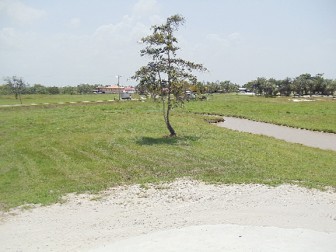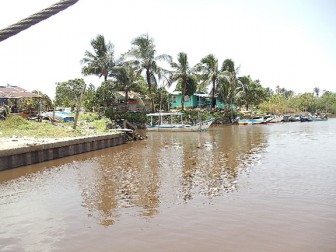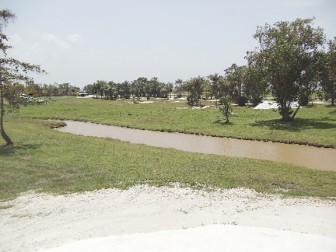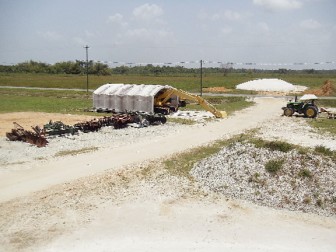While many businesses are searching for space to set up shop or expand in or around the capital city, at least one prominent Georgetown-based business is shifting its operations to an area on the East Bank Essequibo as part of a planned modern community and commercial development venture.
Businessman and ex-politician Stanley Ming says he is preparing to move his main business operations to the new area on the Essequibo River bank as he foresees Parika becoming a pivotal hub for future economic development in the region. Ming, who has been operating his automotive and marine establishment in Georgetown from 1990, says that that it is time for the country to stop seeing the synonymy between development and Georgetown and look to other areas, such as Parika.
In an on-site interview with Stabroek News, the Chief Executive Officer of Mings Products and Services, the local distributor for the Yamaha and Mitsubishi line of products, explained his vision for the community to be named ‘Isika’ (Amerindian word meaning ‘to give’). Ming’s plans range from a fibreglass boat manufacturing facility to a community equipped with state-of-the-art medical, educational and recreational facilities and a place where farmers would process, package and distribute produce to supply the Caribbean and beyond. He also envisions using the new location to better serve the booming gold, agricultural, tourism, transportation and other natural resources industries.

The decision to trade in city life for a rural development plan was never met with trepidation by the businessman, who says he embraces development and hates pollution, traffic congestion and crowded spaces. “The decision to move to Parika was always an easy one for me because I know a business opportunity when I see one and I hate the bumper to bumper traffic. Can you imagine Georgetown in ten years? All the overcrowding, pollution and so on?” he said.
Ming explained that while the main depot for Yamaha marine equipment, supplies and services will be moved to the Parika area, the current premises in the city will be maintained to serve customers from the Georgetown, East Coast Demerara, Berbice and Linden areas.
None of the jobs of current employees would be at risk since they have also indicated that they would accommodate the company’ plans. On the other hand, Ming foresees over 200 jobs being created for residents of Isika and its environs as he works to complement government’s plan to develop Parika into a modern township in the near future. He already has his eyes set on serving residents of the Tuschen Phase 1 and Phase2 housing projects, which the Central Housing and Planning Authority (CH&PA) is currently expediting. When completed, the developments will provide housing for approximately 40,000 residents.

The blueprint for the Isika community shows what was once a bushy swamp being transformed to a pristinely kept and eco-friendly suburb, with a marine merchandising complex, modern supermarket, movie theatre, health facilities, schools, recreational park and modern apartment buildings overlooking the coffee-brown Essequibo River. The community is expected to complement the CH&PA’s ‘Parika Development Plan, 2006 – 2016.’ Photos of the transformation of the site from five years ago to its current state show the rapid development. For this reason, Ming advises aspiring businessmen and women to be careful with whom they share their plans in order to avoid unnecessary skepticism and negativity, whilst staying focused on their goals. Said Ming, “If I had shown some people this, (pointing to photos of the once overgrown swamp), they would have thought, ‘This man is loco (mad). There is no way this can be transformed.’ However, look at it now and it still has a long way to go. Imagine it in four years’ time.”
The beginning of major engineering, infrastructural and construction works is projected for 2014.
Ming admits that although he might not live to see his dream of a greener and healthier community realised in its entirety, he is comforted in the fact that Guyana’s future generations will enjoy a far superior way of life than their parents. He says he will start the process and it is for the next generation that has visions to live the best lives yet, to embrace the concept and ensure that they all have a model to build on.

Being a private developer, conscientious of the community and the environment within which the company’s property is located, he took into consideration global warming, the need to enhance and upgrade the quality of life for future generations, and providing social and economic infrastructure opportunities and learning centres for the benefit of the people of Guyana. So, he will be laying the foundation for the holistic development of the region, he says.






